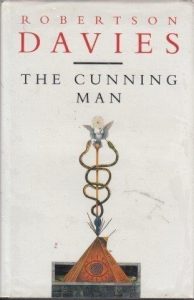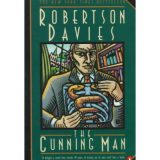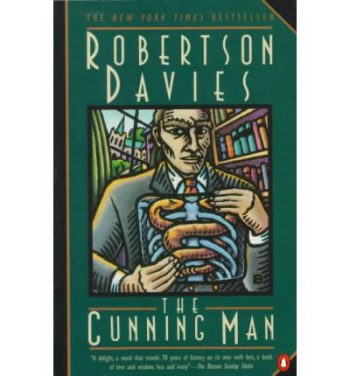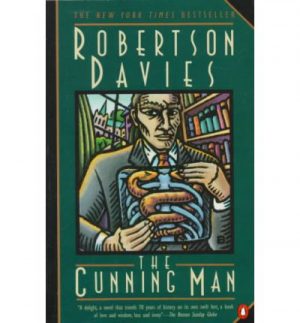The Cunning Man – Robertson Davies – 1994
Reviewed by: Dave Date: 3 December 2001
 Davies once commented that he knew “nothing about medicine” but had the highest degree of “hypochondriachal curiosity about it that is characteristic of authors.” (source: his 1984 lecture entitled Can A Doctor Be A Humanist?). Here in his final novel, Davies seems to have given vent to his curiosity in the creation of the character Jonathan Hullah… an unconventional physician who gains a reputation through his intuitive (albeit successful) diagnostic techniques. For the eccentric Hullah, observation of, conversation with, and even “sniffing” of the patient brings him closer to an accurate prognosis than ever would an impersonal reading of a medical chart. Central to this holistic approach to medicine is Hullah’s appreciation of not only the physical/biological aspects of man’s nature, but also the mental and spiritual, and because of this understanding, he becomes known as the Cunning Man. It is a term borrowed from Robert Burton’s “The Anatomy Of Melancholy” in a passage that appears on Davies’ title page: “Cunning men, wizards, and white witches, as they call them, in every village, which, if they be sought unto, will help almost all infirmities of body and mind… The body’s mischiefs, as Plato proves, proceed from the soul: and if the mind be not first satisfied, the body can never be cured.”
Davies once commented that he knew “nothing about medicine” but had the highest degree of “hypochondriachal curiosity about it that is characteristic of authors.” (source: his 1984 lecture entitled Can A Doctor Be A Humanist?). Here in his final novel, Davies seems to have given vent to his curiosity in the creation of the character Jonathan Hullah… an unconventional physician who gains a reputation through his intuitive (albeit successful) diagnostic techniques. For the eccentric Hullah, observation of, conversation with, and even “sniffing” of the patient brings him closer to an accurate prognosis than ever would an impersonal reading of a medical chart. Central to this holistic approach to medicine is Hullah’s appreciation of not only the physical/biological aspects of man’s nature, but also the mental and spiritual, and because of this understanding, he becomes known as the Cunning Man. It is a term borrowed from Robert Burton’s “The Anatomy Of Melancholy” in a passage that appears on Davies’ title page: “Cunning men, wizards, and white witches, as they call them, in every village, which, if they be sought unto, will help almost all infirmities of body and mind… The body’s mischiefs, as Plato proves, proceed from the soul: and if the mind be not first satisfied, the body can never be cured.”
Because of his expertise and his eye-witness proximity to the actual event, Hullah gets slowly dragged into an investigation regarding the death of Father Hobbes, who collapsed right in front of the High Altar at St. Aidan’s Anglican on Good Friday morning during Holy Communion. Through all of the great doctor’s associations (as all the while, it applies also to himself) we find this theme played out… that to be truly healthy one must pay attention to MORE than merely the physical machine.
I enjoyed this story, but it does not have quite the plot-strength of any of his other ten novels. This will not fizz true Davies’ devotees however. And to the not-already addicted, I encourage you that reading ANY Davies is better than to have not read him at all. He was so extremely witty, and wrote from such a vast personal storehouse of incidental knowledge… ah, we shall not see his like.
Note: Several characters from his previous novel “Murther and Walking Spirits” resurface here in The Cunning Man. There was an intended third novel in the mind of the great writer, and together these would have made up what would have been later known as “The Toronto Trilogy”. But in 1995, Davies left us with these final words from The Cunning Man:
“…this is the Great Theatre of Life. Admission is free but the taxation is mortal. You come when you can, and leave when you must. The show is continuous. Good night.”
We miss you R.D.
















